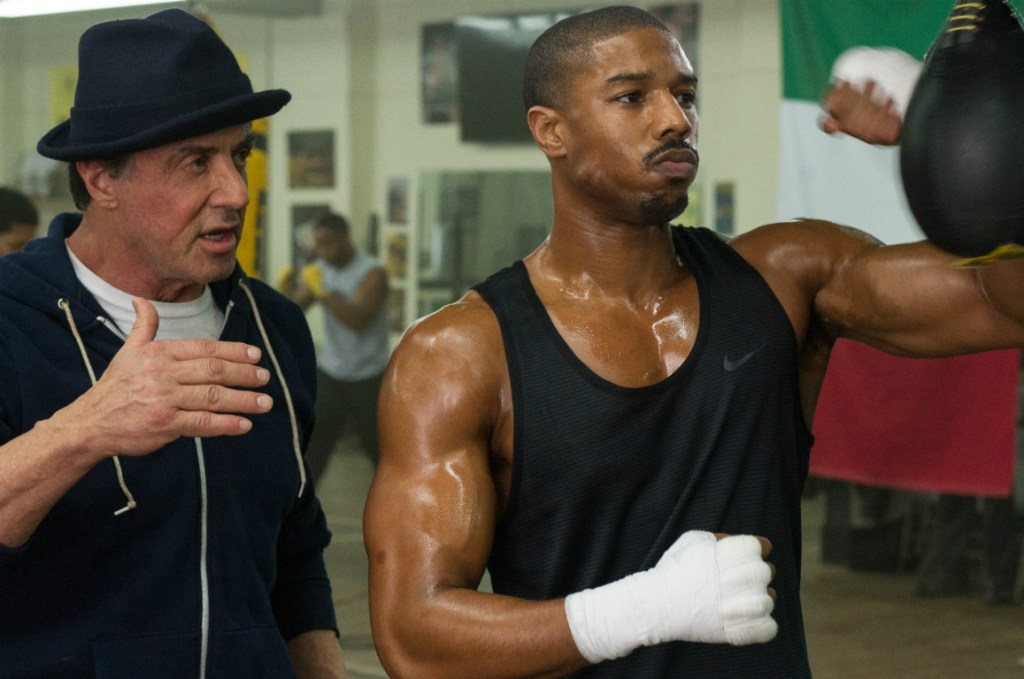
Breezy yet weighty, Ryan Coogler’s Creed makes the most out of the stereotypes it chooses to embrace, recalling nothing so much as Rocky.
Sylvester Stallone wrote the original screenplay as a passion project, intending to give himself the opportunity of a starring role while also demonstrating his abilities as a screenwriter. The movie was a rousing success on all levels, earning Academy Award nominations for Stallone as actor and writer, and winning three Oscars in total. Thirty years and five sequels later, the series concluded with Rocky Balboa, allowing the character to make a graceful, triumphant exit.
After scoring big with indie drama Fruitvale Station, Ryan Coogler pivoted toward Hollywood and pitched an idea for a new installment in the Rocky series, a spinoff focused on the son of once-rival boxer Apollo Creed. What at first sounded like the unlikely premise for a cheap knock-off proves to be the genuine article, a heartfelt meditation on ambition and aging that lightly steps through potential plot-holes with the nimble agility of a championship fighter.
Michael B. Jordan, who also starred in Fruitvale Station, starts the movie off right with his embodiment of a character named Adonis Johnson. His father died before he was born, and his mother was not up to the myriad challenges of parenthood, leaving young Adonis to the care of the state. He learned to fight in order to survive — or did he survive only because he loved to fight?
Whatever the case, Mary Anne Creed (Phylicia Rashad) tracks down her late husband’s child and takes custody when he is 11 years of age. Raised for the balance of his youth in the lap of luxury, Adonis never forgets what he endured, and is determined to become a professional boxer, training himself to the point that he defeats a flurry of opponents in Mexico while holding down a day job at a financial institution.
Offered a promotion, Adonis recognizes that he has reached a “now or never” point in his life, and chooses to follow in his father’s footsteps. He moves cross-country to Philadelphia, takes a cheap apartment, and seeks out his father’s old friend to train him.
That friend is Rocky Balboa, now firmly in retirement as the owner of a small bar. In time, he agrees to train Adonis, and in the process becomes a friend and mentor to the young man who burns with ambition.
Coogler, who is also credited for the screenplay with Aaron Covington, wisely includes the expected nods to earlier films in the Rocky series, but is not beholden to them, following his own distinctive sense of what works for him as a director and, even more so, what is needed for this particular story. Thus, Creed feels like an independently-made studio film, shot by cinematographer Maryse Alberti in an appropriately gritty manner.
Alberti has worked on dozens of documentaries, and the narrative features he has made — notably, The Wrestler — reflect that. So does Creed, which is an asset to counter the film’s occasional dips into sentimentality.
Jordan and Stallone may be at different stages of their respective careers, but what they have shown is that they recognize good material when they see it. Both resist the temptation to overplay the hands they’ve been dealt, allowing Adonis and Rocky to bleed as real people bleed. Similarly, Tessa Thompson provides needed support as Bianca, a love interest for Adonis who is self-sufficient and speaks her mind plainly. Phylicia Rashad makes for a good mother-figure.
Creed strikes a good balance, appealing to populist tastes without overindulging in them. If the concluding fight becomes a mite too predictable, by that point the film has built such a storehouse of good will that it’s easy to overlook. Creed, finally, is an unalloyed triumph.
The film opens today in theaters throughout Dallas.



